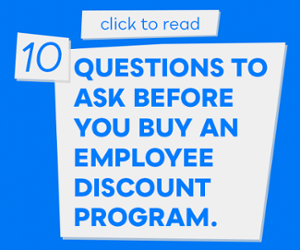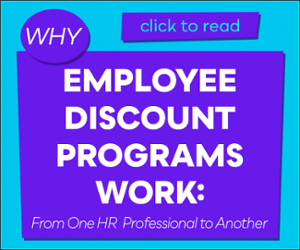Lisa Oyler has been in the field of human resources for over 25 years. For the last 9 of those years, she has served as the Director of Human Resources at Access Perks and sister company Access Development. There, she also grew to become a leading authority on the effects of employee benefits and employee discount programs on engagement and retention.
As an HR professional dedicated to staying at the forefront of industry trends and best practices, I recently had the privilege of attending the highly anticipated 2023 SHRM Conference & Expo. The theme of this conference was Driving Change, and many of the presentations focused on how diversity, adaptability and technology are the pillars by which HR leaders can drive change worldwide.
Even so, I personally felt another theme come through loud and strong: throughout all the rapid changes shaping and reshaping the role of HR, one thing will never change. The most important element an HR professional brings to a company is the human element, the heart and humanity that only an empathetic leader can provide.
75 Years of SHRM
 If you know SHRM, you know. For those who don’t know, the Society for Human Resources Management (SHRM) supports Human Resource professionals in order to “empower people and workplaces by advancing HR practices and by maximizing human professionals.” If anything can shed light on the future of work and HR, it’s the cumulative knowledge gathered and shared between 325,000 active SHRM members in HR professions nationwide.
If you know SHRM, you know. For those who don’t know, the Society for Human Resources Management (SHRM) supports Human Resource professionals in order to “empower people and workplaces by advancing HR practices and by maximizing human professionals.” If anything can shed light on the future of work and HR, it’s the cumulative knowledge gathered and shared between 325,000 active SHRM members in HR professions nationwide.
This year is the organization’s 75th anniversary, which they celebrated during their annual conference and expo. The 2023 conference attracted record-breaking attendance. Attendees who wanted to increase learning in a certain area were provided knowledge tracks, or a list of classes to attend that cumulatively would give a deep dive into subjects like compensation and employee benefits, law & regulations, DEI, workplace culture and more. I chose to learn broadly, attending at least one presentation from every topic, but I also felt that some of the most powerful and empowering topics were tackled by the keynote speakers and guest experts throughout the conference. Here are the most valuable lessons I brought back to my office for inspiration guiding me into the coming year.
HUMAN Resources: From the Mouths of Experts
While the classes gave excellent strategies regarding how and where to “drive change,” the keynote speakers gave powerful testaments about the why part of the equation. I came away with a renewed sense of HR’s essential role in driving positive, meaningful change in the workplace where the wellbeing of individuals takes center stage.
“The Goal is to Make Business More Human.” – Zig Serafin, CEO of Qualtrics
HR now holds one of the top two positions at the decision-making table, according to Qualtrics CEO Zig Serafin. It only makes sense seeing as HR is in the thick of a lot of big workplace topics like AI, return to office, retention and more. The role of being a bridge between leadership and employees puts HR in prime position to gather the data necessary to make informed decisions. One annual survey just won’t do it. Many businesses are realizing they need to put as much effort into understanding their employees as they historically have done to understand their customers.
Data that is collected by actively listening and caring enough to go “under the surface” can have a profound effect on morale. Even more promising, companies that act on this data see nearly 2.5x greater retention.
To make this possible, businesses everywhere are looking to hold deeper emotional connections with their employees – and they’re turning to HR to be the essential strategic partner in making that happen.
“Culture is not just a ‘soft’ word anymore.” – Johnny C. Taylor, CEO of SHRM
Johnny C. Taylor perfectly knotted together all the themes of the conference. He spoke of the many ways AI will change the world, especially the way businesses are run. Can you dream for a second about managing holodeck meeting spaces, human/robot co-worker relations, and other sci-fi advancements are not only looking possible, but plausible in this lifetime? AI is a hot topic as people wonder how it will change their jobs, or if it will take their jobs.
 Then he added, "AI can never, ever replicate your heart. Making each employee feel unique, valued, and heard is something AI will never be able to do. We are the human in human resources."
Then he added, "AI can never, ever replicate your heart. Making each employee feel unique, valued, and heard is something AI will never be able to do. We are the human in human resources."
Job satisfaction is at an all-time high and perhaps that trend can continue as AI takes over administrative tasks, leaving HR professionals more time to focus on things like cultivating workplace culture. I’ve always been passionate about developing a culture where leaders are empathetic and employees feel valued. Right now, it’s more important than ever as people walk away from jobs that don’t align with their deepest values. As Taylor said, it’s not a “soft” word anymore, therefore culture needs some concrete effort in the year to come.
“You have to find time to invest in people while you are living.” – Mitch Albom, author, columnist & radio host
Mitch Album’s speech was particularly inspiring and emotional. He spoke of the lessons he learned writing the memoir “Tuesdays with Morrie,” and how those translate into the core responsibilities of human resources. When you invest your time, your knowledge and your kindness in others, your voice can outlive you. This attitude of giving feels natural for those already leading with empathy. However, we all have more to learn about how to implement that practically in the workplace. For example, if an employee asks to leave work early, asking “why do you need to leave?” elicits a defensive response whereas “when do you need to leave?” helps keep the conversation open and inviting.
It's also important to remember that the C-suite, middle managers and we in HR are people too. It’s healthy to ask for help. Even more importantly, it’s important to be receptive to any help given, even if it’s different from what you expected.
“Politics can’t be about demonizing others. We have to lift each other up.” – Bill Clinton, 42nd President of the United States
The Family Medical Leave Act (FMLA) is so routine now that I’d forgotten it’s a recent addition, put in place under the leadership of Former President Bill Clinton. At SHRM, Mr. Clinton was interviewed on many divisive topics like renewable energy, immigration, gun control and more. Whatever your stance, he concludes that policies that are pro-family, pro-diversity and pro-work consistently bring positive outcomes to the workplace and the economy. For example, diverse groups are shown to make better decisions for their companies than homogenous groups. Also, benefits that support employees achieve purpose in their personal lives (such as through parenting and caregiving) are among the most popular today.
We shouldn’t shoot for either/or policies – those that serve the company or the employees – but dig deeper for the solutions that benefit all.
“My job is taking care of people.” – Ed Bastian, CEO of Delta
Ed Bastian was awarded the Ethical Leadership Award for his leadership at Delta during the pandemic, which was particularly challenging to the travel industry. He gave a short, but stirring, acceptance speech in which revealed just how much he cares about his employees. “I obsess over taking care of them,” he said. An ethical leader is an empathetic leader. One who can look at a problem his employees are facing (like the fact that over 50% of Americans don’t have the funds to cover a $1000 emergency) and come up with a solution (committing up to $1000 emergency fund per employee who completed financial literacy training as Delta did earlier this year).
A crisis doesn’t build character, it reveals character. This holds true for businesses and organizations too. Having ethical policies in place and a culture where empathy can thrive now will ensure we always prioritize the wellbeing of our workforce, no matter what surprises the coming year has in store.
Access Perks Touting the Benefits of Employee Discounts at SHRM
 Were you at the SHRM Conference & Expo too? Hopefully you stopped by the Access Perks Booth in the Expo. The Expo really is a sight to behold. With over 600 vendors available to demo the latest in HR products, services and benefits, it’s enough reason to attend the conference all on its own.
Were you at the SHRM Conference & Expo too? Hopefully you stopped by the Access Perks Booth in the Expo. The Expo really is a sight to behold. With over 600 vendors available to demo the latest in HR products, services and benefits, it’s enough reason to attend the conference all on its own.
We had our very own Ryan Marvel, Brandon Hess, Drew Watson and Rusty Bentley there to explain how employee discount programs can be a powerful addition to your employee benefits program, one that is inclusive and accessible to all.
If you missed us (maybe next year!), you can see a product demo at your convenience here or pick up some fun HR merch here.
Comment below with your top takeaways from the speakers and classes at the SHRM conference. I’d love to keep this conversation going so we can inspire each other toward driving positive change in the years to come.
Related keywords: Best Places to Work in Utah, Best Places to Work in Salt Lake city, Best Employers in Utah, Best IT Jobs in Utah, Best Sales Jobs in Utah, Award Winning Employers in Utah








